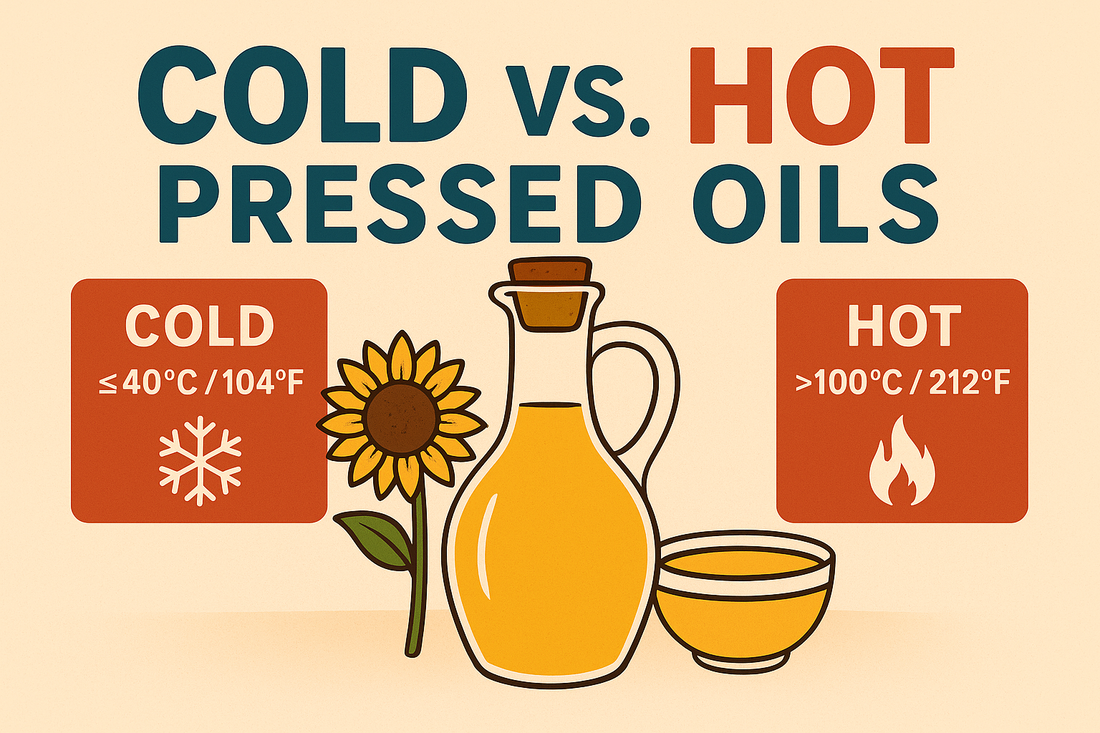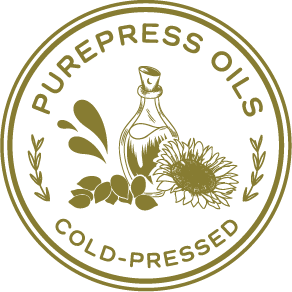
Cold vs. Hot Pressed Oils: What the Science Says About Nutrition
Olesya OdasShare
When you spot a bottle of cold-pressed oil on the shelf, it’s often labeled “healthier” or “more natural.” But is that just clever marketing, or does the science back it up? Let’s dive into the data and find out!
 What Does “Cold-Pressed” Mean?Cold-pressing extracts oil from seeds or nuts without high heat, keeping temperatures below ~40°C (104°F). This gentle method preserves the oil’s natural flavor, aroma, and nutrients like vitamin E (tocopherols) and polyphenols—compounds linked to antioxidant and anti-inflammatory benefits.
What Does “Cold-Pressed” Mean?Cold-pressing extracts oil from seeds or nuts without high heat, keeping temperatures below ~40°C (104°F). This gentle method preserves the oil’s natural flavor, aroma, and nutrients like vitamin E (tocopherols) and polyphenols—compounds linked to antioxidant and anti-inflammatory benefits.
Hot-pressing, by contrast, uses temperatures of 80–120°C or higher to maximize oil yield. While efficient, the heat alters the oil’s chemistry, potentially reducing its nutritional value.
 The Numbers: Cold vs. HotHere’s what research reveals about cold-pressed vs. hot-pressed oils:
The Numbers: Cold vs. HotHere’s what research reveals about cold-pressed vs. hot-pressed oils:
|
Oil Type
|
Cold-Pressed
|
Hot-Pressed
|
Key Finding
|
|---|---|---|---|
|
Pumpkin Seed Oil
|
Higher tocopherols, sterols, phenols
|
Lower levels of these compounds
|
Hot pressing reduces antioxidants (2021 study, Journal of Food Science).
|
|
Canola Oil
|
366–388 mg/kg tocopherols
|
~354 mg/kg tocopherols
|
Cold-pressed retains more vitamin E (Ghazani, 2014, Eur. J. Lipid Sci. Technol.).
|
|
Hemp Seed Oil
|
~410 mg/kg tocopherols (30°C)
|
~513 mg/kg tocopherols (140°C)
|
Higher temps boost tocopherols but reduce oxidative stability (Allay et al., 2025).
|
For hemp seed oil, higher temperatures slightly increase tocopherol levels but harm oxidative stability—how resistant the oil is to spoiling. Spoiled oil loses nutritional value and develops off-flavors due to higher peroxide values (a measure of oxidation).
 What This Means for Your HealthCold-pressed oils retain more natural antioxidants and delicate omega fatty acids, which support heart health and reduce inflammation. Hot-pressed oils, while cheaper and higher-yielding, often lose these bioactive compounds and show signs of oxidation, which can degrade quality.
What This Means for Your HealthCold-pressed oils retain more natural antioxidants and delicate omega fatty acids, which support heart health and reduce inflammation. Hot-pressed oils, while cheaper and higher-yielding, often lose these bioactive compounds and show signs of oxidation, which can degrade quality.
That said, hot-pressed oils aren’t without merit—they’re often more affordable and have a longer shelf life, making them practical for some uses. Still, for maximum nutrition, cold-pressed oils are the clear winner.
 Why We Cold-Press at Purepress OilsAt Purepress Oils, we cold-press all our oils—pumpkin, almond, sunflower, sesame and hemp. This means less oil yield but more of nature’s goodness: vitamin E, plant sterols, omega-3s, and vibrant flavors you’ll taste in every dish. It’s a difference you can feel in your body and savor in your meals.
Why We Cold-Press at Purepress OilsAt Purepress Oils, we cold-press all our oils—pumpkin, almond, sunflower, sesame and hemp. This means less oil yield but more of nature’s goodness: vitamin E, plant sterols, omega-3s, and vibrant flavors you’ll taste in every dish. It’s a difference you can feel in your body and savor in your meals.
 Bottom LineScience confirms cold-pressed oils are the gold standard for nutrition, freshness, and flavor. Ready to taste the difference? Explore our cold-pressed collection at purepressoils.com and elevate your cooking with nature’s finest oils!
Bottom LineScience confirms cold-pressed oils are the gold standard for nutrition, freshness, and flavor. Ready to taste the difference? Explore our cold-pressed collection at purepressoils.com and elevate your cooking with nature’s finest oils!
